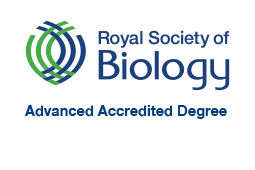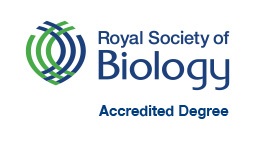Microbiology Code C59F Attend an Open Day Attend an Open Day
Apply NowKey Facts
C59F-
UCAS Tariff
48
-
Course duration
5 years
Available for September start 2026
Further details on entry requirements
Apply NowThis course includes an integrated foundation year.
If you are fascinated by microbes, you will thrive on our MBiol Microbiology degree course here at Aberystwyth University. By choosing to study MBiol Microbiology, you will give yourself a head start by combining a BSc with an extra year of study at postgraduate level to graduate with a Masters qualification. During the three years studying at undergraduate level, you will explore the fascinating world of bacteria, fungi, and viruses, and their role in infectious diseases in humans, animals and plants. During your final year studying at Masters level, you will have the opportunity to apply your subject-specific knowledge and understanding to an independent scientific research project conducted in close collaboration with one of our research groups.
If you want to play a part in solving big global problems such as climate change, pollution and antibiotic resistance, a degree in Microbiology is a good place to start, and our MBiol Microbiology degree will give you the breadth and depth of knowledge required to pursue a successful career as a professional scientist.
Course Overview
Modules September start - 2026
Please note: The modules listed below are those currently intended for delivery during the next academic year and may be subject to change. They are included here to give an indication of how the course is structured.
| Module Name | Module Code | Credit Value |
|---|---|---|
| Communication Skills | BR01520 | 20 |
| Molecules and Cells | BR01340 | 40 |
| Organisms and the Environment | BR01440 | 40 |
| Practical Skills for Biologists | BR01220 | 20 |
| Module Name | Module Code | Credit Value |
|---|---|---|
| Cell Biology * | BR17520 | 20 |
| Ecology and Conservation * | BR19320 | 20 |
| Genetics, Evolution and Diversity | BR17120 | 20 |
| Skills for Biologists * | BR16820 | 20 |
Options
| Module Name | Module Code | Credit Value |
|---|---|---|
| Biological chemistry | BR17320 | 20 |
| Disease Diagnosis and Control | BR15420 | 20 |
| Microbial Diversity and Disease | BR19020 | 20 |
| Microbial and Plant Diversity * | BR19920 | 20 |
| Module Name | Module Code | Credit Value |
|---|---|---|
| Environmental Microbiology and Monitoring * | BR26020 | 20 |
| One Health Microbiology | BR26520 | 20 |
| Practical and Professional Skills in Microbiology | BR24720 | 20 |
| Research Methods * | BR27520 | 20 |
Options
| Module Name | Module Code | Credit Value |
|---|---|---|
| Applied Molecular Biology and Bioinformatics | BR20620 | 20 |
| Cell and Cancer Biology | BR25920 | 20 |
| Immunology | BR22220 | 20 |
| Proteins and Enzymes | BR26620 | 20 |
| Module Name | Module Code | Credit Value |
|---|---|---|
| Biotechnology | BR35520 | 20 |
| Microbial Pathogenesis | BR33720 | 20 |
| Research Project * | BR36440 | 40 |
Options
| Module Name | Module Code | Credit Value |
|---|---|---|
| Bioinformatics and Functional Genomics | BR37120 | 20 |
| Molecular Pharmacology | BR36120 | 20 |
| Terrestrial Ecology Fieldcourse | BR36620 | 20 |
| Veterinary Infectious Diseases | BR34120 | 20 |
| Module Name | Module Code | Credit Value |
|---|---|---|
| Field and Laboratory Techniques | BRM4820 | 20 |
| Frontiers in the Biosciences | BRM0220 | 20 |
| Infection and Immunity | BRM1620 | 20 |
| MBiol Research Project | BRM2860 | 60 |
* Also available partially or entirely through the medium of Welsh
Careers
Teaching & Learning
Typical Entry Requirements
UCAS Tariff 48
A Levels Available to those who are studying for, or who have completed Level 3 qualifications (e.g. A-Levels or BTEC diploma) in subject areas other than biological science, and to mature-aged candidates who have the required GCSEs, experience and motivation.
GCSE requirements (minimum grade C/4):
(minimum grade C/4): English or Welsh, Mathematics and Science
BTEC National Diploma:
Available to those who are studying for, or who have completed the Extended Level 3 BTEC diploma in subject areas other than biological science, or who have taken a BTEC certificate or diploma in any subject, and to mature-aged candidates who have the required GCSE subjects, experience and motivation.
International Baccalaureate:
Available to those who are studying for, or who have completed an international baccalaureate in subject areas other than higher level biological science, and to mature-aged candidates who have the required GCSE subjects (or equivalent), experience and motivation.
European Baccalaureate:
Available to those who are studying for, or who have completed the European Baccalaureate in subject areas other than 4p biological science and to mature-aged candidates who have the required GCSE subjects (or equivalent), experience and motivation.
English Language Requirements See our Undergraduate English Language Requirements (https://www.aber.ac.uk/en/study-with-us/international/english-requirements/ug-english-requirements/) for this course. Pre-sessional English Programmes (https://www.aber.ac.uk/en/international-english/courses/te/) are also available for students who do not meet our English Language Requirements.
Other Requirements Our inclusive admissions policy values breadth as well as depth of study. Applicants are selected on their own individual merits and offers can vary. If you would like to check the eligibility of your qualifications before submitting an application, please contact the Undergraduate Admissions Office for advice and guidance.
Country Specific Entry Requirements:
International students whose qualification is not listed on this page, can check our Country Specific Entry Requirements for further information.
The University welcomes undergraduate applications from students studying the Access to Higher Education Diploma or T-level qualifications, provided that relevant subject content and learning outcomes are met. We are not able to accept Access to Higher Education Diplomas or T-levels as a general qualification for every undergraduate degree course.
Our inclusive admissions policy values breadth as well as depth of study. Applicants are selected on their own individual merits and offers can vary. If you would like to check the eligibility of your qualifications before submitting an application, please contact the Undergraduate Admissions Office for advice and guidance.


